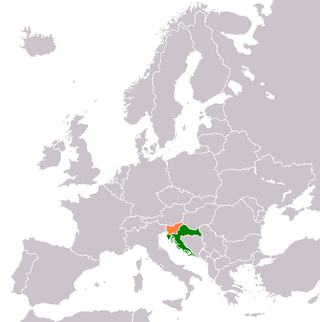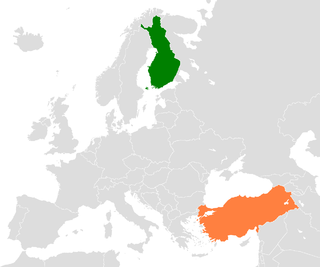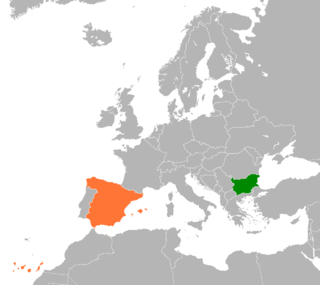The foreign relations of Croatia is primarily formulated and executed via its government which guides the state's interactions with other nations, their citizens, and foreign organizations. Active in global affairs since the 9th century, modern Croatian diplomacy is considered to have formed following their independence from Yugoslavia in 1991. As an independent state, Croatia established diplomatic relations with most world nations – 189 states in total – during the 1990s, starting with Germany (1991) and ending most recently with Liberia (2024). Croatia has friendly relations with most of its neighboring countries, namely Slovenia, Hungary, and Montenegro. They maintain colder, more tense relations with Serbia as well as Bosnia and Herzegovina due to historic nation-building conflict and differing political ideologies.

Croatia and Greece established diplomatic relations on July 20, 1992. Since November 1994, Greece has an embassy in Zagreb. Croatia has an embassy in Athens. The relations between Croatia and Greece have been regarded as excellent with a high cooperation between the two countries on the economic, touristic and political aspect. Greece was a key supporter during the accession process of Croatia to the European Union. Both countries are full members of the European Union, NATO and of the Council of Europe.

The foreign relations between Croatia and Slovenia are bound together by shared history, neighboring geography and common political ideologies. Both states established diplomatic relations in 1992, following the dissolution of Yugoslavia and the independence of Croatia. Modern relations are warm and friendly. The two states have disputes over their border and sovereign rights over certain nuclear and economic assets. The countries share 670 km (420 mi) of common border. They are perennially each other's largest trading partners on an import-export basis.

Finnish-Greek relations are foreign relations between Finland and Greece. Greece was among the first countries to recognize the independence of Finland, on January 5, 1918. Both countries established diplomatic relations in 1920. Since February 1, 1977, Finland has had an embassy in Athens. For a long period Finland was represented in Greece through its embassies either in Bucharest, Rome or Belgrade. Greece has an embassy in Helsinki.

Croatia and Turkey established diplomatic relations in 1992. Turkey recognized independent Croatia in 1991. Croatia has an embassy in Ankara and a consulate-general in Istanbul and 2 honorary consulates in Antalya and İzmir. Turkey has an embassy in Zagreb. Both countries are full members of Council of Europe and of NATO. Croatia is an EU member and Turkey is an EU candidate. Croatia supports Turkey's accession negotiations to the EU, although negotiations have now been suspended.

Croatian–Dutch are foreign relations between Croatia and Netherlands. Both countries established diplomatic relations on April 23, 1992. Croatia has an embassy in The Hague. The Netherlands have an embassy in Zagreb and 3 honorary consulates . Both countries are full members of the Council of Europe, European Union and NATO. Netherlands joined the EU as a founding member state, and Croatia joined the EU in 2013. The Netherlands has given full support to Croatia's membership in the European Union and NATO.

Diplomatic relations between Canada and Finland were established on November 21, 1947. Canada has an embassy in Helsinki, while Finland has an embassy in Ottawa. There are over 143,000 Canadians with Finnish ancestry and over 2,000 Canadian immigrants living in Finland.

France–Finland relations are foreign relations between France and Finland. France was one of the first countries which recognised Finland's independence on 4 January 1918. Diplomatic relations between them were established on 24 January 1918. According to a 2005 BBC World Service Poll, 48% of Finns view French influence positively, with 26% expressing a negative view. There are an estimated 7,000 Finns living in France. Both countries are members of the COE, EU, NATO, and Eurozone. France strongly supported Finland's NATO membership during the latter's accession process. Also France is Observer bureau of the BEAC, CBSS and AC.

The foreign relations between Albania and Croatia are bound together by shared history, neighboring geography and common political ideologies. Both states established diplomatic relations in 1992, following the dissolution of Yugoslavia and the independence of Croatia. They have historically shared a special relationship due to their convergent nation-building efforts. Modern relations are warm and friendly.

Finland–Netherlands relations are the bilateral relations between the Netherlands and Finland. The Netherlands recognised Finland's independence on 28 January 1918. Diplomatic relations between them were established on 14 August 1918. The Netherlands has an embassy in Helsinki Finland has an embassy in the Hague, Both countries are full members of the COE, EU and NATO. The Netherlands supported Finland's NATO membership during Finland's accession into NATO, which was finalized on 4 April 2023. And Netherlands is Observer bureau of the BEAC, CBSS and AC.

Finland–Spain relations are the bilateral relations between Finland and Spain. Both nations are members of the Council of Europe, the European Union, the United Nations, the Schengen Area, the eurozone, and NATO. Spain strongly supported Finland's NATO membership during the latter's accession process. Spain is also one of the favorite destinations of Finnish tourism. Approximately ten percent of the Finnish population travels on vacation each year to Spain. Furthermore, the Finns are the fastest growing European community in Málaga, as Fuengirola is home to the second largest colony of Finns in the world, after Sweden.

Croatia–Poland relations are foreign relations between Croatia and Poland. Both countries are full members of the European Union, NATO, OECD, OSCE, Three Seas Initiative and the Council of Europe. Poland gave full support to Croatia's membership in the European Union and NATO.

Croatia–Sweden relations are foreign relations between Croatia and Sweden. Both countries established diplomatic relations on 29 January 1992. Croatia has an embassy in Stockholm. Sweden has an embassy in Zagreb. Both countries are members of the European Union, Council of Europe and NATO. Croatia strongly supported Sweden's NATO membership during the latter's accession process.

Finland–Turkey relations are foreign relations between Finland and Turkey. Finland has an embassy in Ankara and an honorary consulate general in Istanbul. Turkey has an embassy in Helsinki. Both countries are full members of the Council of Europe, the Organisation for Economic Co-operation and Development (OECD), the Organization for Security and Co-operation in Europe (OSCE), North Atlantic Treaty Organization (NATO), and the Union for the Mediterranean. Also Finland is an EU member and Turkey is an EU candidate. Turkey did not support Finland's accession to NATO until March 2023, but accepted its participation.

Hungary–Sweden relations are foreign relations between Hungary and Sweden. Sweden has an embassy in Budapest, and in Stockholm there is a Hungarian embassy. Diplomatic relations between the two countries started on 28 December 1945. These relations developed to a higher ambassador level. Both countries are members of the Council of Europe, European Union, NATO and Organization for Security and Co-operation in Europe.

Bulgaria–Spain relations are foreign relations between Bulgaria and Spain. Both countries established diplomatic relation on 8 May 1910. Relations were severed in 1946 and were restored in 1970 at the level of Consular Office and Trade Mission. Since 27 January 1970, the diplomatic relations were elevated to embassy level. Bulgaria has an embassy in Madrid and an honorary consulate in Barcelona. Spain has an embassy in Sofia. Both countries are full members of the Council of Europe, the European Union, NATO and the United Nations.

Finland–Germany relations are the bilateral relations between the Finland and Germany. Both countries are part of the European Union, are signatories of the Schengen Agreement, and are members of the eurozone and NATO. Germany supported Finland's NATO membership during Finland's accession into NATO, which was finalized on 4 April 2023.

Croatia–Denmark relations refers to the current and historical relations between Croatia and Denmark. Relations between the two countries are described as "excellent", "friendly" and "well-developed".

Finland has been a member of the North Atlantic Treaty Organization (NATO) since 4 April 2023.

Croatia–North Macedonia relations are foreign relations between Croatia and North Macedonia. Two countries established diplomatic relations on 30 March 1992. Croatia is represented in North Macedonia via its embassy in Skopje and honorary consul in Strumica while North Macedonia is represented in Croatia via its embassy and the Cultural and Informational Center in Zagreb as well as consulate in Rijeka and honorary consul in Zadar. Croatia supports North Macedonia's European Union membership. Before their independence in early 1990s, both countries were constituent republics of the Socialist Federal Republic of Yugoslavia as the SR Croatia and SR Macedonia respectively. Croatia was one of the first countries in the world to recognize the independence of the country during the period in which Zagreb itself awaited international recognition. During the long-lasting Macedonia naming dispute (1991–2019) and before the signature of the Prespa agreement Croatia was the first country in the world to recognize North Macedonia under its constitutional name of the Republic of Macedonia instead of appellation "the former Yugoslav Republic of Macedonia". Today, both countries are full members of the Council of Europe, and of the NATO. Croatia is an EU member and North Macedonia is an EU candidate. Since 2006 North Macedonia is a member state of the Central European Free Trade Agreement while Croatia was a member of the area between 2003 and 2013. Croatia strongly supports accession of North Macedonia to the European Union and also supported its NATO membership, being one of the first countries to ratify the membership protocol. Trade between the two countries reached 221 million euros in 2020.
























